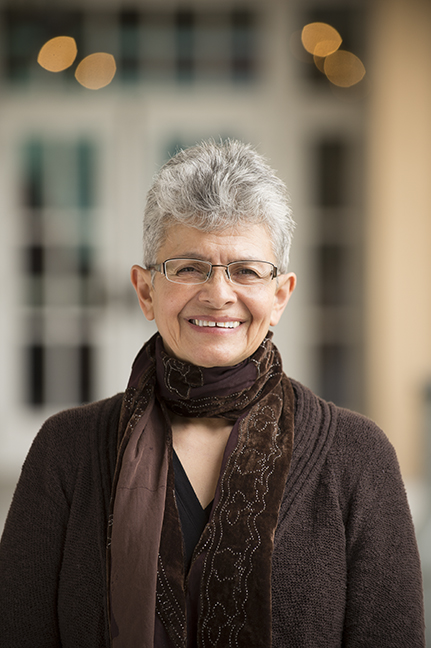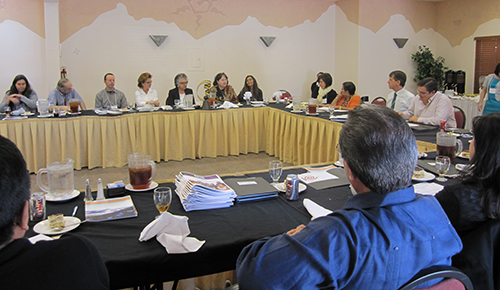To build a culture of health equity in New Mexico by establishing partnerships between UNM researchers and community residents in indigenous Native American and Latino/Hispanic communities.
To strengthen research aimed at eliminating health disparities, the Community Engagement Core focuses on three intervention-based principles:
- Partnering with communities through Community-Based Participatory Research (CBPR).
- Intervening at multi levels within a cultural and social context; and
- Translating scientific community-based evidence into equity interventions (practice and policies)
- Intercultural Communication Leadership
- Community-Based Participatory Research
- To build relationships based on trust
- To create partnerships between researchers and community in order to support research towards achieving health equity and fairness in diverse communities
- To support institutional reflection and change to enhance partnerships and capacities of UNM to conduct health equity research with and across diverse communities in New Mexico
- To create multi-directional partnerships between academic Researchers and Community constituents (clinicians/providers, policy makers, community organizations, and community members);
- To promote academic researcher reflection and organizational assessment of barriers and bridges to community engagement, and to develop action strategies and best practices for enhancing community trust, and university/community partnerships;
- To develop co-learning and mentoring opportunities through allies of "Intercultural Health Disparity Scholars" and summer co-learning One-Day Institutes;
- To translate and share findings with our community partners to enable practice, program, and policy interventions.
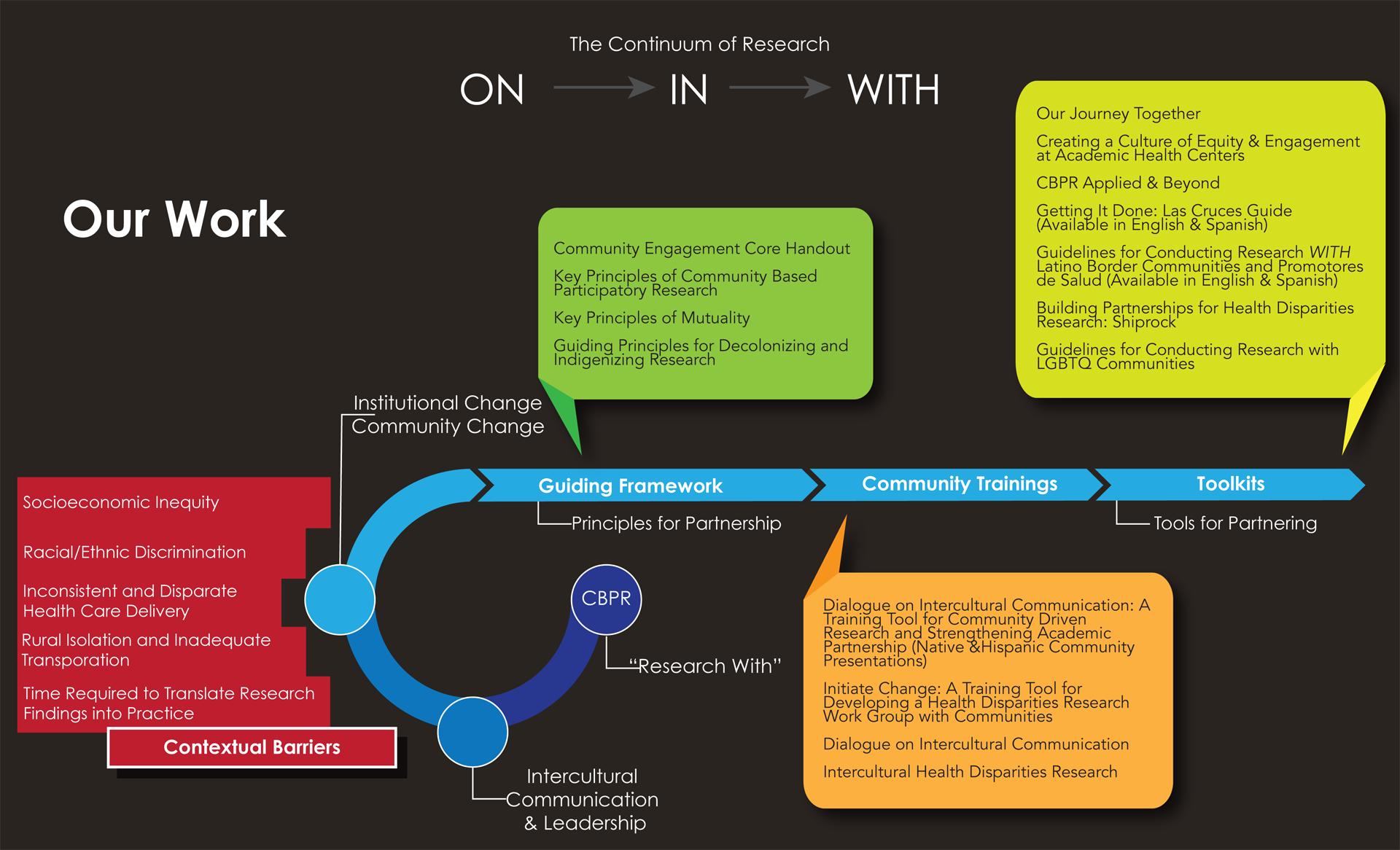
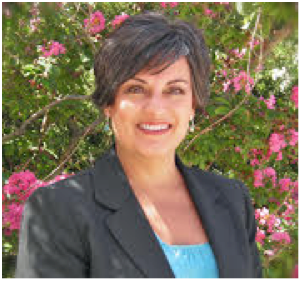
Lisa Cacari-Stone, PhD, is Director of the Community Engagement Core is Assistant Professor with the Department of Family and Community Medicine and Senior Research Fellow with the Robert Wood Johnson Center for Health Policy at UNM. She has been a national recipient of the W.K. Kellogg Doctoral Fellowship in Health Policy Research at the Heller School of Social Policy and Management, Brandeis University, where she received her doctoral degree in 2004. From 2005 to 2008, she served as an H. Jack Geiger Congressional Health Policy Fellow for Senator Edward M. Kennedy with the Committee on Health, Education, Labor and Pensions. During that time, she also was a W.K. Kellogg Scholars in Health Disparities Program and Alonzo Yerby post-doctoral scholar at the Harvard School of Public Health. Dr. Cacari’s research explores the influences of border migration, and social policy upon health as well as the role of community engagement in developing interventions that might reduce those health disparities. She teaches two courses, "Health Policy Politics and Social Equity" and "Border, Migration and Latino Health" for graduate students in health and social sciences.
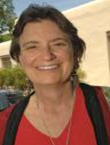
Nina Wallerstein, DrPH, is Professor in the Department of Family and Community Medicine, and was the founding Director of the Masters in Public Health Program at the University of New Mexico until 2007. She currently is the Director of the Center for Participatory Research, Institute for Public Health, Vice President's Office of Community Health; Director of Community Engagement and Research of the Clinical Translational Science Center, and Senior Fellow in the Robert Wood Johnson Foundation Center for Health Policy at UNM. She received her DrPH and MPH in Community Health Education at the School of Public Health, University of California, Berkeley. For over 25 years, she has been involved in empowerment/popular education, and participatory research with youth, women, tribes, and community building efforts. She is the co-editor of Community Based Participatory Research for Health, 2nd edition, 2008 (with Meredith Minkler); co-author of Problem-Posing at Work: Popular Educator's Guide; and author of several other health and adult education books and over 100 articles and book chapters on participatory intervention research, adolescent health promotion, alcohol and addictions prevention research, empowerment theory, and popular health education. She has worked in Latin America with the Pan American Health Organization in participatory evaluation of healthy municipalities and communities, and in development of empowerment and health promotion trainings. Her current research interests focus on community capacity and health development in tribal communities, culturally appropriate translational intervention research, and community based participatory research processes and outcomes.
Sonia Bettez, PhD in Sociology of Health is a Post-doc in the Department of Sociology at the University of New Mexico, a graduate of the Robert Wood Johnson Center for Health Policy and a Senior Fellow with the Center. She has been working with the Community Engagement Core for over a year, applying her skills and interest in health equity within Latino populations. Sonia’s main interest is to translate research in the sources and consequences of health inequity into policy and to make research accessible to programs and communities working towards equity. A native of Colombia, South America, she is bilingual and bicultural and has worked with underrepresented minorities in the United States for over 30 years.
Clarence Hogue Jr., BA, is a Navajo/Diné from Fruitland, New Mexico and currently resides in Albuquerque. Clarence received his Bachelor of Arts in Speech Communications from Brigham Young University. He has been working in the youth development field for over ten years and has been supporting youth program development in American Indian communities in the southwest region of the U.S., including school based and community based programs. Clarence has also worked for his tribe supporting community and economic development projects. He consults with various organizations, i.e. schools, non-profits, community groups and provides project coordination and training services. Clarence has a strong interest in working with grassroots community initiatives and would like to pursue and focus his next career track around health advocacy for Native peoples and other underserved populations. Clarence will be working on the Community Engagement Core team as the Project/Research Coordinator.
chogue@salud.unm.edu
Liana Quinn-Hussein, BA, a native of Pojoaque in rural northern New Mexico, demonstrated an innate interest in health, society, and the intersection of both from an early age. This interest led her to seize an opportunity in college to do biomedical research in rural and urban Nigeria and acquire an undergraduate degree in psychology. Currently pursuing a graduate degree in Community Health Education with a minor in Public Health from the University of New Mexico, she continues to merge her passion for travel with her promotion of health education and advocacy for underprivileged populations, particularly in the specialties of chronic disease prevention, maternal and child health, and health literacy. Together, Liana and her husband (who is originally from Kenya) journey regularly to her husband’s birthplace, where both there and in the U.S., they belong to a circle of similarly-minded people from diverse cultures that pursue wellness at every level, fitness, and a healthy lifestyle. Liana is currently the Research Assistant for the Community Engagement Core of NM CARES Health Disparities Center, and her work on the Community Engagement Core Team supports projects in health disparities research.
Nora Chavez, BA, holds a BA in Business Administration and a minor in Global Marketing. With over 20 years experience in fundraising and development and community organizing, she has worked in fundraising for non-profit organizations specializing in rural development, native philanthropy, and cultural preservation. As a member of the Lipan Apache Tribe of Texas, Nora is active in all aspects of Native American Restorative Justice.
The Community and Scientific Advisory Council (CSAC) is comprised of key internal and externals Institutional and community stakeholders who provide critical review and guidance of the center’s developments and progress, and advises on future directions of the center. These stakeholders include:
| Linda Armas, De Colores |
Dorlynn Simmons, MSSW, Mescalero HIS Hospital |
| Harold Bailey, PhD, NM Office of African American Affairs |
Anne Simpson, MD, UNM Office of Community Health |
| Beverly Becenti-Pigman, Navajo IRB |
Beverly Singer, PhD, UNM Dept. Of Anthropology |
| Laura Gomez, JD, PhD, UNM Law |
Roxane Spruce-Bly, Native Healthcare Council of NM |
| Arthur Kaufman, MD, UNM Office of Community Health |
Alfredo Vigil, MD |
| Richard Larson, MD, PhD, UNM HSC |
William Wiese, MD, MPH, RWJF Center for Health Policy at UNM |
| Tassy Parker, RN, PhD, Center For Native American Health, UNM |
Cheryl Willman, MD,UNM Cancer Center |
| Sharilyn Roanhorse, NM HSD |
Harriet Yepa-Waquie, MSW, ABQ Service Unit Diabetes Education Program |
| Delores Roybal, Con Alma Foundation |
|
| Hon. Alice Salcido, MPH, Probate Judge Doña Ana County |
|
CSAC Meeting, January 2012
Rio Grande Best Western Inn
Dr. Maria Yellow Horse Brave Heart addresses: Building research capacities to bridge cultural and indigenous knowledge and practices with empirically supported theories and interventions. Dr. Brave Heart introduces the concept of Historical Trauma and its impact on the health of American Indian/Alaska Native children, youth and their parents. She also provides an overview of the Historical Trauma Unresolved Grief Intervention (HTUG) as an approach to addressing intergenerational massive group trauma healing.
Roberto Chene’, provides training for those that function in multicultural settings and the focus of the training was develop across racial and cultural allied relationships, intercultural leadership and creative conflict resolution skills. The training focused on guiding principles and strategies for developing mutually beneficial intercultural relationships and partnerships for conducting health disparities with communities.
Dr. Nina Wallerstein provides sessions on CBPR and related approaches, i.e., Participatory Action and Community-Engaged Research a “collaborative approach that equitably involves all partners in the research process…with the aim of combining knowledge and action for social change to improve community health and eliminate health disparities”(Kellogg Foundation). CBPR is an overall orientation, not a method which fundamentally changes the relationship between researchers and researched. The module explored how CBPR intersected with indigenous knowledge and methodology, including the challenges for academics and community members to co-construct knowledge for improved community health.
Slides from CBPR Training
The following modules were developed by the Community Engagement Core Team along with featured community scholars/consultants with expertise in CBPR with Latino/Border and Native American Communities in New Mexico.
Clarence Hogue provides training on approaches to community engagement for researchers on developing personal relationships with leaders or other representatives of communities, understanding the needs, desires, and characteristics of that community, and making your research needs more understandable and acceptable to these communities.
Dr. Lisa Cacari Stone provides training for community leaders, health advocates, university researchers, health providers and policy makers on “tools, methods and processes for evidence informed policy making.” Her work supports the premise that “good policy follows good science” Supporting the policy research skills development of multi-cultural leaders and communities most burdened from health inequities is a step-towards from “discovery to practice and policy-based solutions.” She also provides consultation on Latino and border health research.
Building Partnerships for Health Disparities Research: Native and Hispanic Communities
Building Effective Partnerships on the Border
Dialogue on Intercultural Communication: Espanola, Tewa Pueblos, Northern New Mexico Community College





